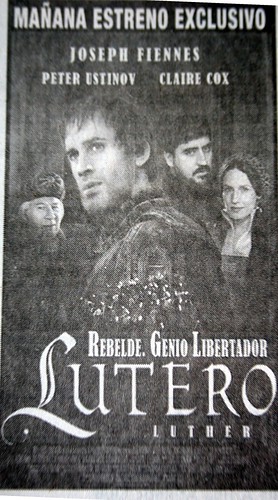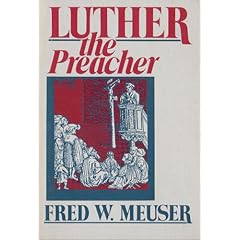 As I was sitting in Quinta Lutero, reading El Universal, I noticed the 2003 movie Luther was showing in Caracas. The movie tagline was "Luther: Rebel. Genius. Liberator". Probably Luther would not have been comfortable with any of those titles, but the words chosen to draw in the crowds were interesting. I don't think they were selected specifically for Latin America, but "Libertador" has serious , almost messianic connotations here.
As I was sitting in Quinta Lutero, reading El Universal, I noticed the 2003 movie Luther was showing in Caracas. The movie tagline was "Luther: Rebel. Genius. Liberator". Probably Luther would not have been comfortable with any of those titles, but the words chosen to draw in the crowds were interesting. I don't think they were selected specifically for Latin America, but "Libertador" has serious , almost messianic connotations here.I have seen the movie, which stars Joseph Fiennes as Luther, Claire Cox as Katherine Luther and Peter Ustinov as Frederick the Wise. The film may serve as an introduction to Luther's life and times for some, but I think Luther is portrayed as having too much 21st Century angst in some parts and too much of an action hero in others (if you have seen the movie, too, you will know what I am talking about).
One of the best scenes did not involve Luther at all; that was where the princes who signed the Augsburg Confession bowed their heads for beheading rather than recant their faith. I am not sure that really was what happened, either, but it still was a scene which dramatized what was as at stake for many people who professed their faith at that time.
For me, the 1953 film, "Martin Luther", starring British actor Niall McGinnis, remains the best, most historically accurate movie made about Luther's life.
Anyway, I looked at the ad and thought of the night before. Isaac Machado had brought a set of snare drums to Quinta Lutero (I gather the drums will play some role in the second Congress of Lutheran Educators, scheduled for next month). My fellow students, Sergio, Eduardo and Juan Carlos, all much younger and more musically talented than myself, were with the drums and guitars rocking out to Luther's hymn, "Erhalt uns, Herr, bei deinem Wort". The most familiar English translation, by Catherine Winkworth, goes like this:
Lord, keep us steadfast in Thy Word;
Curb those who fain by craft and sword
Would wrest the kingdom from Thy Son
And set at naught all He hath done.
Lord Jesus Christ, Thy pow’r make known,
For Thou art Lord of lords alone;
Defend Thy Christendom that we
May evermore sing praise to Thee.
O Comforter of priceless worth,
Send peace and unity on earth.
Support us in our final strife
And lead us out of death to life.

The Spanish, rock-oriented version of this was rather good. So is most of the music the guys select for our morning chapel service up the hill at El Salvador Lutheran Church (where the instrumental accompaniment is guitars and piano, no drums). Unfortunately, Venezuela, like the United States, has its share of "Jesus is my boyfriend" music, but we sing the less politically correct but more doctrinally sound stuff. For example, I almost had forgotten what a great hymn is "Stand Up, Stand Up For Jesus" ("Estad por Cristo Firmes"), or "Onward, Christian Soldiers"("Firmes y Adelante").
As we offer these songs as our prayers for our Lord's guidance and strength in grateful response to His grace in Word and sacrament, we receive counsel and comfort as we contemplate the challenges ahead of us. One of the books we are studying from is a Spanish translation of Luther the Preacher by Fred W. Meuser (Augsburg/Fortress Publishing, 1983).
Meuser writes: "For Luther, preaching was not a preacher's ideas stimulated by the prod of a text. It was not human reflections about God and life. It was not searching around in one's personal religious insights for some kind of contemporary message that one thinks that people need. Christian preaching -- when it is faithful to the word of God in the Scriptures about our need and God's response to it -- is God speaking. When it focuses on what God has done for the world in Jesus Christ, it is God speaking. When it invites faith and presents Christ so that faith becomes possible, it is God speaking...When the proclamation about Christ is the biblical message of God's judgment and grace, not only is the preacher's word God's word, God is really present and speaking. In the sermon one actually encounters God. That makes preaching -- and hearing -- a most dangerous business."

Meuser writes further: "...for Luther, a sermon was an apocalyptic event that set the doors of heaven and hell in motion, a part of the actual continuing conflict between the Lord and Satan.It is the most dangerous task in the world because 'where Christ appears, there the devil starts to speak'. The sermon -- and the congregation that hears it -- is a battlefield in the eschatological struggle beween Christ and the adversary...Aside from this war, the word and what it sets in motion in the souls of people cannot be understood."
We are being entrusted with the task of taking the holy Gospel of Christ into places where perhaps the Devil himself sits enthroned. Please pray for us.
Please also remember in prayer:
- Our preschool in la Caramuca. We have started the new semester with 28 children enrolled;

- Neida Gónzales de Mireles, whose grandmother died last week;
- Veronica, the infant daughter of Pastor Francisco Cabarcas and his wife, Dagnys, who just underwent an operation;
- The congregation of Corpus Christi in Barinas, which has started onstruction of a new kitchen, bathroom facilities and an apartment to house a vicar in January. The plan is for myself and another man to serve both Corpus Christi and la Caramuca as vicars.



